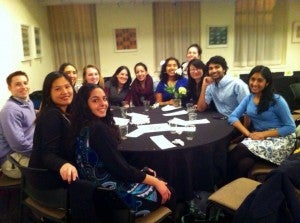Gerut: More Than Just Jewish Immigration
As I lugged my duffel bag down to the CSJ on the first morning of spring break, I was excited and exhausted and anxious and curious, all at once. I had gotten a lot of sneak peak previews of our Alternative Breaks Program (ABP) trip — Gerut: the DC Immigrant Experience, but I was still nervous about what was to come. At the end of a packed and informative week, there were two experiences from this trip that I am particularly grateful for: the first was volunteering at CARECEN, and the second was attending Shabbat at Sixth & I Historic Synagogue.
At CARECEN, we had the opportunity to help immigrants study for the U.S. citizenship test, in which individuals must correctly answer questions about the American government and history, and prove proficiency in English in order to become a U.S. citizen. As an immigrant myself, I can clearly see the structural barriers and the injustices in this test, but the people that we met didn’t seem to care. They were determined and passionate and hard-working, willing to do whatever it might take to prove to the government that they were worthy of holding a U.S. passport. It was humbling to see people work so hard to learn, when I, for the most part, take my basic education and privileged language skills for granted.
 At Sixth & I, our group attended Shabbat, which is the Jewish worship service on Friday night. We listened to the rabbi speak about self-care using language that resembled the Jesuit concept of cura personalis. We also listened to the rabbi discuss the importance of empowering others to care for themselves and of taking care of others when they are incapable. In my mind, the connection between the Shabbat service and our discussions on immigration during the week was clear: we had a duty to care for the ger toshav, the non-citizen among us. My own immigrant community consists of non-citizen immigrants, and I have a duty to help care for them, and for every other immigrant community that I encounter. Who among us is more vulnerable than a person without statehood? That Shabbat service tied together the experiences of the week for me, and inspired me to begin to invest more of myself in the immigrant community.
At Sixth & I, our group attended Shabbat, which is the Jewish worship service on Friday night. We listened to the rabbi speak about self-care using language that resembled the Jesuit concept of cura personalis. We also listened to the rabbi discuss the importance of empowering others to care for themselves and of taking care of others when they are incapable. In my mind, the connection between the Shabbat service and our discussions on immigration during the week was clear: we had a duty to care for the ger toshav, the non-citizen among us. My own immigrant community consists of non-citizen immigrants, and I have a duty to help care for them, and for every other immigrant community that I encounter. Who among us is more vulnerable than a person without statehood? That Shabbat service tied together the experiences of the week for me, and inspired me to begin to invest more of myself in the immigrant community.
Though Gerut was never exactly what I imagined it would be, it was a formative experience for me during my first year at Georgetown. I am grateful to have met the people I met, to have heard the stories I heard, and to have helped the people I helped. Most of all, I am grateful for the opportunity to have opened my mind and heart to such a strong community here in D.C. and at Georgetown.
Piyusha Mittal, F’18